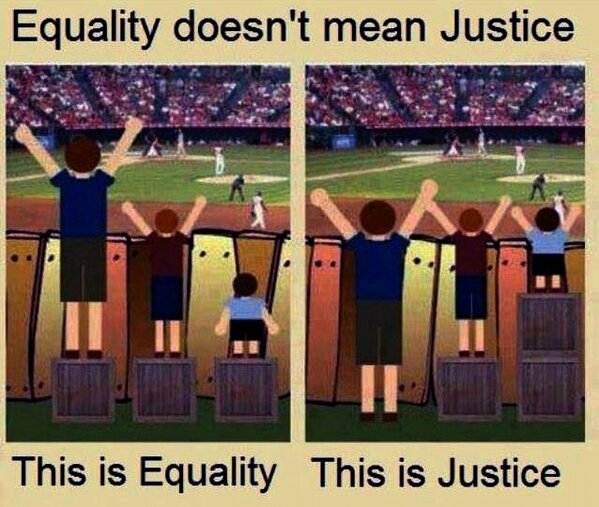It is very difficult to explain this distinction to any professional who has no understanding that my son's race, gender, perceived socioeconomic status and his degree of disability combine to leave him vulnerable to the same negative stereotypical biases that have caused harm to him in the past. What is seen as equal is presumed to be just. My son needs three boxes to reach the justice of a free and appropriate education. He cannot be presumed to be treated fairly because his treatment is equal to another child of equal pathology who has no intersectional factors increasing risk of unjust placement and maltreatment in the classroom.
Appropriate education was meant to achieve equality with average students in public schools. But this approach is rarely just, particularly for students who must overcome misdiagnoses of emotional and behavioral disorders often placed upon them automatically. Their race and gender are used to presume that rather than educational supports they require behavioral management. Exclusively with males who are Black, the attitude with special education professionals is always an entrenched demand about controlling the pupil, and this is based on a systemic type of racism that assumes that if a person is poor, male, and Black, their behavior will become aggressive eventually. So every action is viewed through the lens of the racist legacy of a history of violence. The same action by a non-Black student might not be viewed in that light at all. A self fulfilling prophecy for nonspeaking autistic males, who are hypersensitive to fear in others and will react by mirroring the fear they sense in classroom staff and trying to defend themselves against whatever may come at them. Add to that administration by risk management and fear of responsibility for some imagined outcome if some child is not locked away from their peers and you have a recipe for discrimination that is an infinite loop until a student ages out of the school system. A 'good' student will then have learned to comply with rigid routine, the primary rule for living in an institution. They will learn helplessness, not self advocacy. The 'bad' student will have increasing force used against them until some catastrophic event occurs.
Sadly I realize that if my son and most of his peers did not carry these labels, what would be the primary focus of any educational roadmap would be what is just. How does one counter a mentality based on historical fear of large males of color combined with a historical fear of neurodivergent individuals? Professionals are often not even aware of the fear and bigotry driving their decisions and responses. If told "this response is ableist" or "that opinion is actually a racist assumption rather than a professional observation" they will use their credentials to balk and react with hostility. "Parent" will be used as a derogatory word. One's credibility as a parent will come into question.
In the distant past threats were made to us during meetings in an attempt to instill a fear of reprisal to our son or us should we complain or demand justice.
Yet now my son's future, as well as that of his intersected peers, is in their hands. How can we navigate this booby-trapped environment?
I am trying to base communication on facts and focus on quantifiable observations and assessments. This is the best I can do. I have no control over the bigotries, fears, and disdain of those who might work with my son going forward except to be on the lookout for red flags in those people and how my son reacts in their presence. I have had the honor of getting to know my son well for three years. I trust him. He does not need to speak to let me know someone is mistreating him. I can only return him to being the lead protagonist in his own life and stand by him as he overcomes obstacles himself. But when you know this institutionalized ableist racism exists, and it looms over your child's world decimating the quality of life he might achieve it hurts. Beyond the injustice of it all, it is an exercise in standing by helplessly hoping your child can survive his education. It is frightening.
As we arrive with our son closer to end of our four year battle for his right to be educated, I want justice. I cannot accept less. My son deserves justice. I want him to have his right to an untainted free and appropriate education. I do not know how, under the present system he can achieve this goal. But he deserves to be back in command of his own life story in safety and peace.
Wish us luck. We really need it.


No comments:
Post a Comment
Note: Only a member of this blog may post a comment.